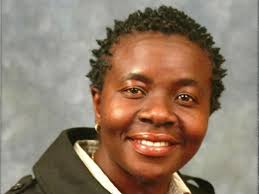By Byron Mutingwende and Moses Chibaya
Zimbabwe’s human right record comes under international spotlight as the Election Resouce Centre has said that it was disturbed by the violent interruption of Parliament activities by unruly elements of society.
Scores of suspected Zimbabwe African National Union Patriotic Front (ZANU PF) youths and women in Mutare, Thursday morning caused the disruption of a public hearing that was convened by the Parliamentary Portfolio Committee on Justice Legal and Parliamentary Affairs in Mutare. In the melee that ensued, the violent ZANU PF supporters assaulted Honorable Jessie Majome, the Chairperson of the Committee.
The assailants, mostly women charged at Majome and dragged her by the collar baying for her blood. Majome has since reported the incident at Dangamvura police station.
The disruption in Mutare follows similar at Nyamakwere Hotel in Mutoko on the 26th of October 2016.
The Mutare meeting was being held at Beit Hall in Dangamvura area. About 500 citizens attended the consultative meeting organized at the behest of the Election Resource Centre (ERC) and 14 other civic groups who petitioned Parliament to expedite electoral reforms.
“When the meeting started a question was raised by some members of the public on the agenda of the meeting. Hon Gonese (MDC-T Member of Parliament for Mutare Central constituency who is also a member of the committee) took the public through the petition which was submitted to Parliament by the Election Resource Centre (ERC) and 14 other civil society organisation in September 2015.
“He also explained the public hearing process,” Tafara Moyana, a local Mutare resident said.
The skirmishes started after three members of the public had made contributions regarding electoral reforms, however, some suspected ZANU PF youths, alleged to have been bussed by Dangamvura-Chikanga legislator, Esau Mupfumi interrupted the meeting.
“Three members of the public had contributed their views on the petition before the meeting was turned into chaos,” Moyana said.
The ERC is gravely concerned by the growing trend which is a clear indication of deliberate efforts to disrupt the ongoing public hearings aimed at soliciting public input towards alignment of Electoral Laws with the Constitution of Zimbabwe.
“It is the hope of the ERC that the success of this process would be a first step towards constitutionalism, credible elections and the creation of a level playing field in electoral processes. However, some political parties who have for a long time benefitted from the status quo are clearly against these efforts of improving electoral processes in the country. Zimbabwean citizens must be allowed to freely express themselves and contribute towards the holding of free, fair and credible elections,” the ERC Executive Director, Tawanda Chimhini said.
“Furthermore, the attacks on Parliamentarians must be condemned in the strongest possible terms. It is unacceptable and perpetrators must face the full wrath of the law.
Violence, whatever form, encroaches upon Section 52 (a) of the Constitution which guarantees the right of every person to freedom from all forms of violence from public and private sources. All citizens, state and non-state actors, have the right to participate and input their views on the electoral reform process freely without fear,” Chimhini fumed.
The Parliamentary portfolio committee, having scrutinised a petition submitted to it by a local think tank and advocacy institution on democracy and elections, the ERC, in line with Section 149 (1) of the Constitution of Zimbabwe, is conducting nationwide public hearings in Harare, Concession, Mutoko, Mutare, Bulawayo, Gwanda and Gweru to gather citizen views on the petition which calls for the extension of the right to vote to all eligible voters including the hospitalised, prisoners and those in the diaspora, independence of the Zimbabwe Electoral Commission (ZEC), increased swift access to electoral justice, opening up voter education to stakeholders as a continuous process and enabling an accessible and transparent voter registration process.
The Thursday meeting in Mutare was the fourth meeting after Harare, Concession and Mutoko.
Zimbabwe’s human rights record will be examined by the UN Human Rights Council’s Universal Periodic Review (UPR) Working Group, for the second time on Wednesday 2 November 2016.
Zimbabwe is one of the 11 States to be reviewed by the UPR Working Group during its upcoming session taking place from 31 October to 11 November. Zimbabwe’s first UPR took place on 10 October 2011.
The documents on which the reviews are based are: 1) national report – information provided by the State under review 2) information contained in the reports of independent human rights experts and groups, known as the Special Procedures, human rights treaty bodies, and other UN entities; 3) information provided by other stakeholders including national human rights institutions, regional organizations and civil society groups.
Among the issues raised in the above-mentioned documents are: efforts to improve the administration of the rule of law, justice system and law enforcement; efforts to curb corruption; improving the conditions of detention and alleviating prison congestion; eliminating torture and ill-treatment; the reintroduction of the death penalty; combatting human trafficking; issues of food security and nutrition; access to quality drinking water and health care services; poverty eradication efforts; issues of sanitation, housing and land rights; equitable access to quality education; freedom of expression, assembly and association; equality and non-discrimination including of women, persons with disabilities and LGBT persons; eliminating sexual violence and child marriages; birth and death registration; and the economic challenges towards the realisation of human rights.
